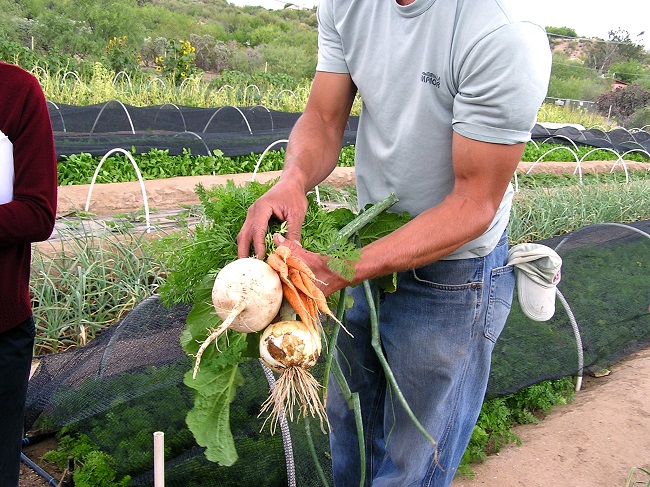If you own a garden or farm and want to start a business, but marketing or sales is not your forte, you may want to consider starting a CSA. Something attractive about a CSA is that you do not have to provide all the produce yourself; a CSA allows for networking with other local growers, sales are direct, and sometimes you can get some other benefits if you plan correctly.

A CSA, or Community Supported Agriculture is an organization or co-op share program allowing people in the surrounding community to purchase locally grown foods direct from the farmer and/or gardener. A garden, group of gardens, and/or a farm get together and offer shares to people. The people pay an up-front fee for weekly supplies. These supplies are always locally grown, many times organically, and are selling only what is in season. The shares purchase blocks for a certain time frame such as two or three months. The CSA determines which vegetables they are going to grow and will include a menu from which people can choose. Some examples would be “all fruit”, “all greens”, “mixed bag”, etc. You just let a shareholder select their option on a form, fill out their information, and pay up front. A pickup point is determined, and shareholders come by to pick up their shares on the designated day or days.
Prices for a share will vary according to what can be offered (fruits, vegetables, meats, dairy, etc.) and how much will fill a share. I have seen prices as low as $200 for two months and as high as $450 for two months. The higher priced plans included eggs, cuts of meat, and some prepared foods like pickles and cheeses. The CSA organizers will discuss what they are going to offer ahead of time, the costs associated with the product offering, how much they can produce on their own, and when the start and end dates of the CSA share will be. Once they have this in place, they can figure how many shares they will offer. A share will usually be for one family. However, a farm I work closely with has sold blocks of shares to restaurants that want specific crops that are local and organic. Depending on the clients, shares may also be sold in fractions, say to create the option for a single person or a two-person home.
What will be offered as part of the shares? Some examples of offerings from one farm I know that has been successfully doing this for years has included a variety of heirloom tomatoes, carrots, okra, cucumbers, raspberries, peppers, squash, potatoes, and even popcorn. This farm also has about a hundred chickens and offers eggs as part of their shares for an extra fee. There are some that can even offer dairy and meat products.
A benefit to selling the CSA shares prior to the growing season is that the farm will be able to cover all costs up front and has a guaranteed cash flow instead of waiting until after harvest to collect money from sales of produce. Another benefit is networking between farms and/or gardeners. For instance, if one farm is only one acre, they can only produce so much of any one type of vegetable. This would not be an attractive option for a consumer. Networking and planning allows growers to delegate what will be grown and where it will be grown, and put together a diverse offering for the share offering. This does take a little work but is worth it in the end.
An often-overlooked advantage to a CSA is the direct relationship that develops with the community. One of our customers allows people to help on the farm with harvesting, weeding, planting, etc. They will have anywhere from 2-10 volunteers working on the farm at any given time. In exchange for the work, the farm often gives the volunteers some produce to take home. Another thing we have been working on with a couple places is the use of fermented food wastes as a replacement for fertilizer and compost.
Fertilizers are a large expense for the farms. Replacing their input costs completely with fermented food wastes allows them to not only save money, but it also allows them to discard the compost piles and creates more recycling for shareholders. Some CSAs will collect fermented food waste buckets on the pickup day and return rinsed buckets and lids to the shareholders. In urban areas, such as Brooklyn, this allows apartment dwellers to fully recycle all their food wastes in an ecologically sound manner instead of sending them to an incinerator or landfill. Inviting people to the farm also allows for a little bit or tourism and referrals. People love to know where their food comes from and appreciate the interaction with the farmers.
If you think a CSA is for you, I suggest contacting at least one and speaking with them to learn from them. They are usually open to discussing what they are doing and can give you lots of pointers of mistakes they learned along the way.
The USDA has more information about CSAs as well as links to directories to find local CSAs. If you start one, take advantage of some of these directories and get your CSA on at least one of them. You can also market shares and your produce at local farmers markets. Eric Lancaster is Executive Vice President of TeraGanix, Inc. Their website at Teraganix.com.
Related Articles & Free Email Newsletter
Aquaponics: From Fish to Fertilizer
Planning and Designing a Productive Vegetable Garden




Comment here